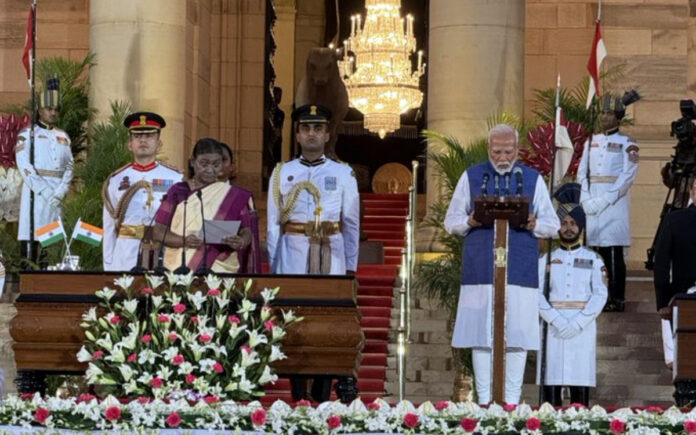New Delhi: Narendra Modi took the oath of office as India’s prime minister on Sunday, marking a record-equalling third term in office. He makes history as the first non-Congress leader to achieve this milestone, joining the ranks of former Prime Minister Jawaharlal Nehru in securing three consecutive terms. However, Modi assumes leadership as the head of a restless coalition following a surprising setback in the polls, which will test his ability to maintain policy stability in the world’s most populous nation.
President Droupadi Murmu administered the oath to Modi at a grand ceremony held at the Rashtrapati Bhavan in New Delhi. The event was attended by thousands of dignitaries, including leaders from seven regional countries, Bollywood celebrities, and industrialists.
Modi, who rose through the ranks as a spokesperson for the Hindu nationalist Rashtriya Swayamsevak Sangh (RSS), the ideological parent of his Bharatiya Janata Party (BJP), now joins independence leader Jawaharlal Nehru as the only individual to serve three consecutive terms as prime minister.
Securing his third term through elections that concluded on June 1, Modi formed an alliance with 14 regional parties within his BJP-led National Democratic Alliance (NDA), diverging from the outright majority his party secured in the previous two terms.
The election outcome was perceived as a significant setback for the popular leader, as surveys had anticipated the BJP to secure even more seats than in 2019. Despite Modi’s achievements in driving economic growth and elevating India’s global status, domestic concerns such as job scarcity, inflation, low incomes, and religious tensions influenced voters’ decisions.
During Modi’s tenure as chief minister of Gujarat from 2001 to 2014, the BJP held strong majorities, enabling decisive governance. However, his third term as prime minister is anticipated to encounter challenges in building consensus on divisive political and policy matters, given the divergent interests of regional parties and a resurgent opposition.
Analysts express concerns about the fiscal implications in the rapidly growing economy, anticipating pressure for increased development funds for states governed by the NDA’s regional allies. Moreover, the BJP may face demands to boost welfare spending to regain support lost in the recent election.
While Modi’s election campaign was marked by religious rhetoric and criticism of the opposition’s stance toward India’s minority Muslim population, he has adopted a more conciliatory approach since the unexpected election results.
“We have secured a majority, but consensus is crucial for governing the nation… We will strive for consensus,” Modi declared on Friday after being formally appointed as the coalition head by the NDA.



